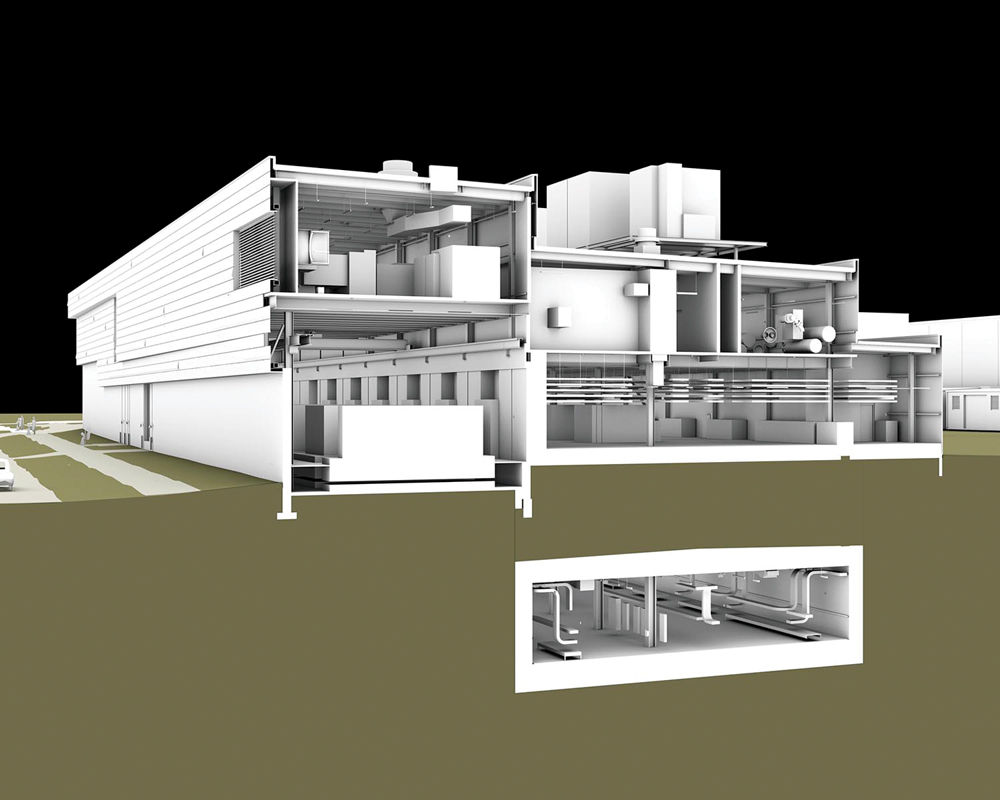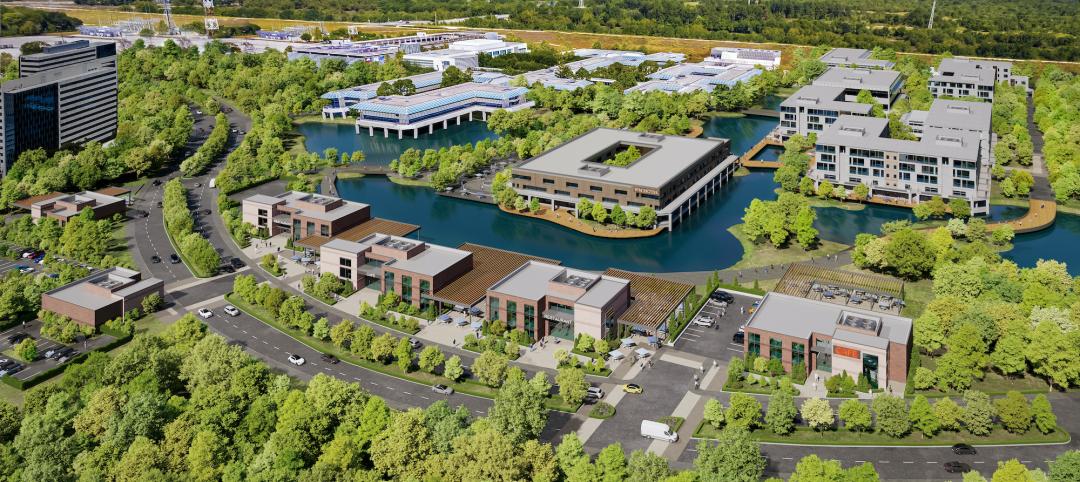Automated clash detection. Been there, done that. Quantity takeoffs. Mastered it. Virtual construction coordination. Old news.
More than 25 years after the first BIM software tools came to market, the U.S. construction industry has largely mastered the BIM/VDC learning curve and is implementing 3D BIM coordination on a regular basis. According to Building Design+Construction’s 2013 Giants 300 survey, 80% of the nation’s largest architecture, engineering, and construction firms have adopted BIM/VDC tools and report having earned revenue working on BIM-driven projects.
Let’s face it: Most of what’s discussed in the BIM/VDC arena today is yesterday’s news. So BD+C set out to identify the next big developments in BIM/VDC technology and implementation. We reached out to dozens of AEC firms that made our annual BIM Giants lists and asked one simple question: What does BIM 2.0 look like to you? Here’s what they had to offer:
Precise field-placing using robotic total stations
Structural steel items embedded in cast-in-place concrete are often misaligned or omitted in the field due to poor coordination between the structural engineer, concrete subcontractor, and steel erector. In a broader sense, the use of meta data in a building model promises great benefits, but it has not found a place in general practice because of questions of accuracy, responsibility, and liability for use of the data.
TOP BIM ARCHITECTURE FIRMS
2012 BIM Revenue ($)1 Gensler $484,286,1302 HOK $385,700,0003 HDR Architecture $299,828,0004 Perkins+Will $270,225,0005 Skidmore, Owings & Merrill $267,601,7006 HKS $216,000,0007 Stantec $197,000,0008 Cannon Design $165,000,0009 RTKL $131,834,950910 SmithGroupJJR $105,598,00011 EYP $85,381,169
TOP BIM ENGINEERING FIRMS
2012 BIM Revenue ($)1 Jacobs Engineering Group $4,465,746,0002 URS Corp. $292,864,7493 Science Applications International Corp. $131,066,2354 Arup $123,364,0285 Merrick & Co. $106,000,0006 SSOE Group $99,560,5617 Thornton Tomasetti $93,431,5458 Buro Happold Consulting Engineers $78,006,0009 Middough $60,000,0009 KPFF Consulting Engineers $60,000,000
TOP BIM CONSTRUCTION FIRMS
2012 BIM Revenue ($)1 Turner Corporation, The $5,924,000,0002 Clark Group $2,224,508,1273 DPR Construction $2,175,000,0004 Hoffman Construction $2,155,377,2765 Hensel Phelps $2,089,180,0006 Mortenson Construction $1,992,450,0007 Balfour Beatty $1,902,988,3328 McCarthy Holdings $1,879,000,0009 JE Dunn Construction $1,513,283,00510 Walsh Group, The $1,313,656,333
Even though hardware and software are available today, we lack a standard practice outlining the responsibilities of each stakeholder to create, verify, and utilize geospatial data in the BIM model.
—Steve Wilkerson, Associate Vice President, Haynes Whaley Associates
Extracting data for FM operations
The next “big trend” in BIM is the set-up, coordination, and extraction of data in COBie (Construction Operations Building Information Exchange) format so that more information can be pulled from the BIM model for use in client-based FM software, such as Maximo and AiM. The primary obstacle is figuring out how to do this when so much information for a project resides in multiple models. Programs such as BIMLink will be developed to help with the management of these “data buckets” and with the flow of that data out of and back into BIM models.
This trend will also push the AEC industry closer together, and new ways of collaborating—such as IPD multiple-party, single-contract delivery methods—will continue to evolve to help remove the obstacles to integrating data from all of the necessary parties involved.
—Sam Boyd, Quality Assurance Director, Cooper Carry
BIM on the go
Mobility is becoming more important. Multi-disciplinary teams in multiple locations collaborating on one model will require faster data networks and the use of cloud computing. Take that to the next step and design teams will be expected to instantly communicate with the construction and fabrication in the field through the model in the cloud.
We’re also going to see teams untethered from their desktops using more mobile tools (tablets, smartphones, etc.) to modify, navigate, and display the model. We are starting to work with tools that allow us to open BIM models on an iPad or iPhone to share with clients on the go.
—Don Ghent, Principal and Global Technical Leader, Gensler
Creating a common BIM language
The Industry Foundation Classes (IFC) being developed by buildingSmart International will eventually define actual data elements of a building model and standardize them industrywide. The group is working to develop and promote a standard data format that can be used across all platforms (Revit, Tekla, Bentley, etc.) so that data can be transferred and read across all model authoring and audit software programs. The walls of proprietary software will be broken down by IFC. All models will soon be able to interact with each other in ways not possible before.
—Aleisha Jaeger, LEED AP, Operations Manager-Construction, Epstein
The rise of virtual reality
The integration of BIM with virtual reality technologies is a promising development. For example, use of augmented reality—where both graphical and contextual information are overlaid onto building systems in the real world to produce the effect of x-ray vision—will allow the operator to see the utilities installed in a wall cavity, ceiling space, and even underground. The possibility of cost savings using these applications is fascinating, and the execution and user experience are quite simple (e.g., Google Glass viewer or mobile device such as an iPad).
—Andre Zoldan, Chief Information Officer, Albert Kahn Associates
Other ideas offered by the group include:
• Use of early phase database programs, such as Trelligence’s Affinity, to do programming and planning in a database-rich environment that can be directly imported into BIM programs.
• Automating code compliance review with the BIM model. The International Code Council is leading and funding the buildingSMART initiative to develop SMARTcodes, which could allow teams to automate the entire code review process.
• Establishing central project control. Building models, along with the use of RFID, barcode technology, and GPS will soon facilitate “smart” job sites. For example, materials arriving on site will automatically be sensed and recorded by the model as delivered. No paperwork will be required.
Related Stories
Student Housing | Dec 7, 2022
Cornell University builds massive student housing complex to accommodate planned enrollment growth
In Ithaca, N.Y., Cornell University has completed its North Campus Residential Expansion (NCRE) project. Designed by ikon.5 architects, the 776,000-sf project provides 1,200 beds for first-year students and 800 beds for sophomore students. The NCRE project aimed to accommodate the university’s planned growth in student enrollment while meeting its green infrastructure standards. Cornell University plans to achieve carbon neutrality by 2035.
Office Buildings | Dec 6, 2022
‘Chicago’s healthiest office tower’ achieves LEED Gold, WELL Platinum, and WiredScore Platinum
Goettsch Partners (GP) recently completed 320 South Canal, billed as “Chicago’s healthiest office tower,” according to the architecture firm. Located across the street from Chicago Union Station and close to major expressways, the 51-story tower totals 1,740,000 sf. It includes a conference center, fitness center, restaurant, to-go market, branch bank, and a cocktail lounge in an adjacent structure, as well as parking for 324 cars/electric vehicles and 114 bicycles.
Multifamily Housing | Dec 6, 2022
Austin's new 80-story multifamily tower will be the tallest building in Texas
Recently announced plans for Wilson Tower, a high-rise multifamily building in downtown Austin, Texas, indicate that it will be the state’s tallest building when completed. The 80-floor structure will rise 1,035 feet in height at 410 East 5th Street, close to the 6th Street Entertainment District, Austin Convention Center, and a new downtown light rail station.
Geothermal Technology | Dec 6, 2022
Google spinoff uses pay-as-you-go business model to spur growth in geothermal systems
Dandelion Energy is turning to a pay-as-you-go plan similar to rooftop solar panel leasing to help property owners afford geothermal heat pump systems.
Contractors | Dec 6, 2022
Slow payments cost the construction industry $208 billion in 2022
The cost of floating payments for wages and invoices represents $208 billion in excess cost to the construction industry, a 53% increase from 2021, according to a survey by Rabbet, a provider of construction finance software.
Mixed-Use | Dec 6, 2022
Houston developer plans to convert Kevin Roche-designed ConocoPhillips HQ to mixed-use destination
Houston-based Midway, a real estate investment, development, and management firm, plans to redevelop the former ConocoPhillips corporate headquarters site into a mixed-use destination called Watermark District at Woodcreek.
Office Buildings | Dec 5, 2022
How to foster collaboration and inspiration for a workplace culture that does not exist (yet)
A building might not be able to “hack” innovation, but it can create the right conditions to foster connection and innovation, write GBBN's Chad Burke and Zachary Zettler.
University Buildings | Dec 5, 2022
Florida Polytechnic University unveils its Applied Research Center, furthering its mission to provide STEM education
In Lakeland, Fla., located between Orlando and Tampa, Florida Polytechnic University unveiled its new Applied Research Center (ARC). Designed by HOK and built by Skanska, the 90,000-sf academic building houses research and teaching laboratories, student design spaces, conference rooms, and faculty offices—furthering the school’s science, technology, engineering, and mathematics (STEM) mission.
Mass Timber | Dec 1, 2022
Cross laminated timber market forecast to more than triple by end of decade
Cross laminated timber (CLT) is gaining acceptance as an eco-friendly building material, a trend that will propel its growth through the end of the 2020s. The CLT market is projected to more than triple from $1.11 billion in 2021 to $3.72 billion by 2030, according to a report from Polaris Market Research.
Giants 400 | Dec 1, 2022
Top 50 Parking Structure Architecture + AE Firms for 2022
Choate Parking Consultants, Gensler, Clark Nexsen, and Solomon Cordwell Buenz top the ranking of the nation's largest parking structure architecture and architecture/engineering (AE) firms for 2022, as reported in Building Design+Construction's 2022 Giants 400 Report.
















